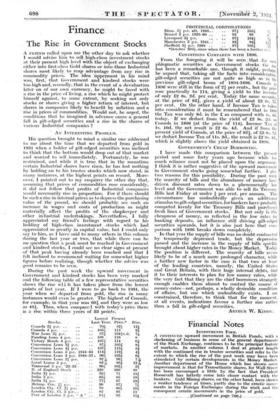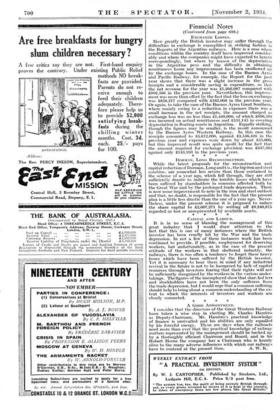Financial Notes
INVESTMENTS FIRM.
A coN-ruct-En upward movement in British Funds; with a slackening- of business in some of the .general departments of the Stock Exchange, continues to be. the principal feature of markets. In another column I deal at greater length with the continued rise in trustee securities and refer to the extent -to which the rise of the -past week may -have been stimulated by certain developments in the Money Market. Another department of the House which has shown -sonw • ' improVemnt is that for Transatlantic shares, for Wall Street has been encouraged a little by. the fact that President. 'Roosevelt. has, latterly come into :closer contact with the bankers. Gold Mining shares, on the other hand, have shown a weaker tendency at times, partly due to the erratic Move- -merits in the Foreign Exchanges during the week and the consequent erratic movements in the price of gold. __(Continued. on page. 700.) _ • _ —
Financial Notes
(Continued from page 698.)
EXCHANGE LOSSES.
How greatly the British investor may suffer through the difficulties in exchange is exemplified in striking fashion in the Reports of the Argentine railways. Here is a case where conditions *ithin the country itself have improved consider- ably and where the companies might have expected to benefit correspondingly, but where by reason of the depreciation in the Argentine peso and the difficulty in obtaining remittances home any improvement has been swallowed up by the exchange - losses. In the case of the Buenos Ayres and Pacific Railway, for example, the Report for the past year shows that there was a slight increase in the gross receipts and a considerable saving in expenditure, so that the net revenue for the year was £1,202,087 compared with £992,566 in the previous year. Nevertheless, this improve- ment was more than offset by the fact that the loss on exchange was £850,217 compared with £163,000 in the previous year. Or again, to take the case of the Buenos Ayres Great Southern, where mainly owing to a reduction in expenses there was a small increase in the net receipts, the amount charged as exchange loss was no less than £1,448,000, of which £896,589 was incurred on actual remittances and £551,145 in covering depreciation in floating assets in Argentina. Equally striking, though the figures may be smaller, is the result announced by the Buenos Ayres Western Railway. In this case the receipts amounted to £3,612.000, against 0,546,426 in the previous year and expenses were down by about £55,000, but this improved result was quite spoilt by the fact that the amount required for exchange provision was £347,362 against only £143,103 in the previous year.















































 Previous page
Previous page